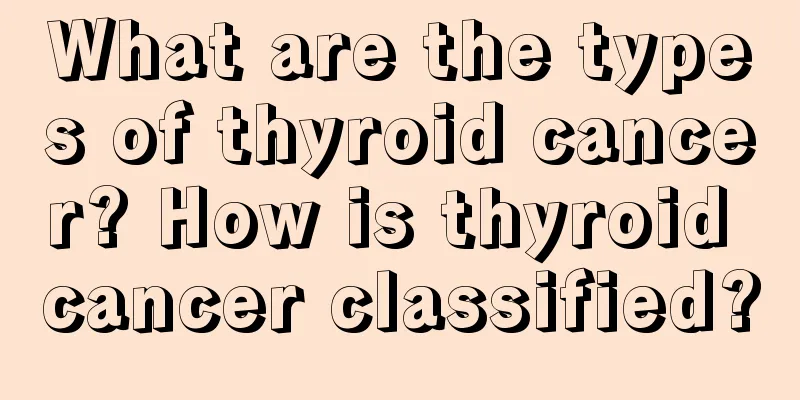How to prevent liver cancer in life? Pay attention to these 6 types of people who are prone to liver cancer

|
Liver cancer is a malignant tumor of the liver, which can be divided into two categories: primary and secondary. Primary malignant liver tumors originate from the epithelial or mesenchymal tissue of the liver. The former is called primary liver cancer, which is a highly prevalent and extremely harmful malignant tumor in my country; the latter is called sarcoma, which is relatively rare compared to primary liver cancer. So, who is prone to liver cancer? How can we avoid it? Let's take a look at the following introduction: Who is more likely to develop liver cancer? They are: 1. Infection with hepatitis B virus (HBV) and/or hepatitis C virus (HCV) 2. Nonalcoholic fatty liver disease 3. People with liver cirrhosis caused by various reasons and those with a family history of liver cancer 4. Long-term alcoholism 5. Eating food contaminated with aflatoxin 6. Men over 40 are at greater risk If any of the above situations occur, experts recommend taking timely measures. For example, for the first three, early examination and diagnosis are needed. If there is a possibility of liver cancer, treatment measures should be taken as soon as possible. For the last three, regular physical examinations are also required. If there are any abnormalities, if they can be detected in the early stages, the treatment effect will be good. So, what tests should be done if liver cancer is suspected? 1. Liver function test Liver cancer patients should undergo liver function tests, most of which are normal. Liver function damage may occur when accompanied by cirrhosis. Some patients have high serum alanine aminotransferase. Liver function damage caused by liver cancer is only seen in patients in the late stage. 2. Tumor marker test (1) Alpha-fetoprotein (AFp): It is a specific tumor marker for diagnosing primary liver cancer and plays a role in establishing diagnosis, early diagnosis, and differential diagnosis. Currently, enzyme-labeled immunosorbent assay, enzyme-labeled electrophoresis, and radioimmunoassay are commonly used for detection. It is particularly useful in the diagnosis of early subclinical liver cancer and timely surgery can greatly improve the survival rate of patients. It has important clinical value in the efficacy and prognosis of liver cancer surgery, chemotherapy, integrated Chinese and Western medicine treatment, radiotherapy, etc., as well as in the dynamic measurement of serum alpha-fetoprotein. (2) Serum ferritin (SF): It is the second serological marker for primary liver cancer. The concentration of serum ferritin is related to the degree of liver cell damage, the presence or absence of liver cirrhosis, the amount of liver iron stored, and the size of liver tumors. Literature reports that the positive rate of serum ferritin in diagnosing primary liver cancer is 50.8% to 88%. If alpha-fetoprotein and serum ferritin are measured together, the positive rate of any one of them as a diagnostic indicator is as high as 92.1%. In particular, serum ferritin measurement is quite meaningful when the alpha-fetoprotein concentration is low or negative. Therefore, the combined use of serum ferritin and alpha-fetoprotein will further improve the early diagnosis rate of primary liver cancer. 3. Serum determination (1) Alkaline phosphatase: The serum alkaline phosphatase of liver cancer patients is often elevated, with a positive rate of 65%. When the level exceeds the King-Achter unit, there is no jaundice, or there is obstructive jaundice and the alkaline phosphatase is disproportionately elevated, indicating the possibility of liver cancer. (2) r-glutamyl transpeptidase (r-GT): The positive rate of liver cancer patients is 84.2% to 91.2%. The increase of this enzyme may mainly come from the tumor itself. (3) Isoenzyme: The determination of isoenzyme includes lactate deaminase (LDH) isoenzyme determination. LDH5 activity increases in primary liver cancer. Besides regular checkups, how can ordinary people prevent it? Ordinary people who do not have liver diseases such as hepatitis B, hepatitis C, and cirrhosis are less likely to get liver cancer, so there is no need to worry too much. However, an unhealthy lifestyle is also an important factor in causing liver cancer, so everyone should start with the following: How to prevent liver cancer? 1. Vaccination Vaccination is the most practical and effective method, mainly hepatitis B vaccination. Studies have shown that universal hepatitis B vaccination can effectively reduce the hepatitis B virus surface antigen carrier rate from 10% to 1.3% after 10 years, and significantly reduce the incidence of liver cancer after 16 years. 2. Do not eat moldy food The fungi that produce aflatoxin mainly grow in humid tropical and subtropical regions and can cause corn, peanuts and other grains to mold, so you should avoid eating these moldy foods. 3. Control your emotions Emotions, work pressure, and especially a bad mentality have a great impact on the immune system, adding fuel to the fire. After learning that they have been infected with the hepatitis B virus, many people are afraid and depressed, lose their appetite all day, and touch their livers with their hands, sometimes for two or three hours, worried that hepatitis will turn into cancer. If this emotion persists for a long time, it will lead to a series of changes in the nervous, endocrine and immune functions, significantly reducing the anti-cancer cells in the blood, and cancer will really occur. 4. Do B-ultrasound Liver B-ultrasound is one of the most effective methods for early detection of liver cancer. Hepatitis B patients and hepatitis B virus carriers should undergo a liver B-ultrasound examination every six months when their condition is stable. In addition, young and middle-aged people who are tired and stressed should also have a liver B-ultrasound examination during their health check-up. 5. Stop drinking Alcohol in the human body needs to be detoxified by the liver, the largest chemical factory in the human body. The acetaldehyde produced in this metabolic process is extremely toxic to the human body and can cause cell damage, fat deposition in liver cells, inflammation and necrosis of liver cells, and hyperplasia of fibrous connective tissue, which can eventually lead to cirrhosis of the liver, and some cirrhosis of the liver will turn into liver cancer. |
Recommend
Is sweating good or bad for lung cancer
Is sweating good or bad for lung cancer? Sweating...
What are some teas that can promote blood circulation and remove blood stasis?
For women, due to physiological reasons such as m...
What should I do if my hair falls out after using silicone-free shampoo
Once hair falls out, patients will be very nervou...
What is the treatment for allergic conjunctivitis
Allergy is not only a common cause of some skin d...
What are the scented teas that can promote blood circulation and remove blood stasis?
Qi and blood can play a key role in a person'...
What are the benefits of acupuncture
In our country, acupuncture is a very traditional...
What is the best way to treat anxiety and phobia?
Nowadays, many young people often encounter this ...
Is it really good to drink milk before going to bed?
Nowadays, with the improvement of living standard...
How to treat mild hypertension, 3 methods to help you
Hypertension is a common disease that is related ...
How to strengthen the body to fight cancer in the late stage of liver cancer
"If you nourish the body, the accumulation w...
Is glutamyl transpeptidase 68 normal?
Glutamyl transpeptidase belongs to a kind of huma...
What are the benefits of Siwutang foot bath
Speaking of Siwu Decoction, I believe many women ...
Drowning first aid steps
If you cannot swim, do not go swimming in the riv...
What are the causes of dilated cardiomyopathy
Many people do not understand dilated cardiomyopa...
Where will endometrial cancer metastasize
Endometrial cancer has no obvious symptoms in the...









